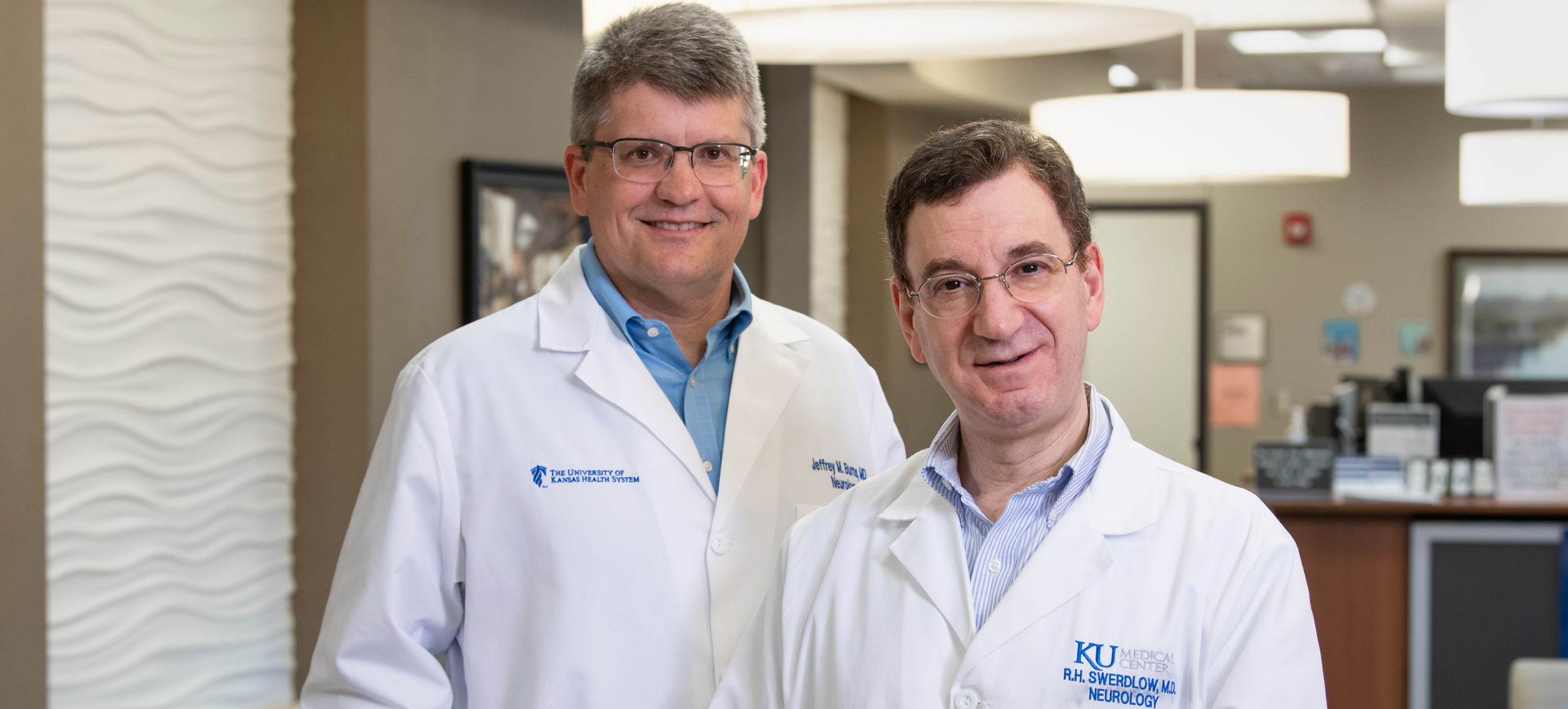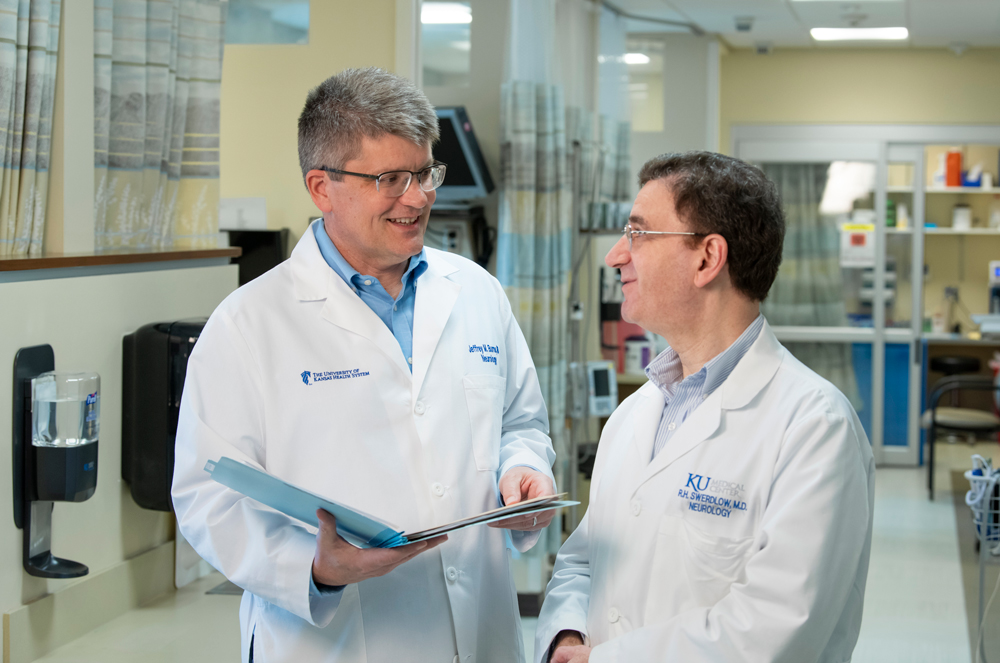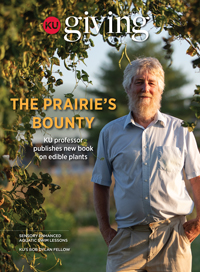KU Giving Magazine
A New Narrative for Brain Health
Valerie Gieler

BRAIN HEALTH ADVOCATES: KU Alzheimer Disease Research Center director Dr. Russ Swerdlow (right) and co-director Dr. Jeff Burns are bringing access to direct care, research studies and strategies to support brain health to our region.
Donor support for the KU ADRC's vision leads to vast growth potential
When you aren’t feeling quite yourself, most people count on being able to quickly see a doctor to discuss symptoms, take a simple test if needed, receive a diagnosis, start treatment and begin to get better. With Alzheimer’s disease and other types of dementia, however, the process is a lot more complicated for many reasons.
Alzheimer’s is quite complex and often requires a variety of methods for diagnosis. These can be costly and time-consuming, potentially including interviews, memory tests, lab tests, a lumbar puncture and brain scans. Other challenges are the sheer number of people needing care — about 175,000 people in Kansas and Missouri and 6 million people nationwide are living with Alzheimer’s — and the limited number of cognitive care specialists available. Combine all this with historically limited options for treatment, and it’s easy to see why researchers and doctors are focused on changing this reality.
Drafting a different story
This is a transformative time in Alzheimer’s treatment and research, and the University of Kansas Alzheimer’s Disease Research Center (KU ADRC) is an international leader in the effort as one of only 33 centers designated by the National Institute on Aging. The KU ADRC aims to rewrite the narrative on all types of dementia through the center’s Brain Health Care Accelerator initiative led by co-director Dr. Jeff Burns and director Dr. Russ Swerdlow.
Progress based on the KU ADRC’s research efforts and years of work on the Brain Health Care Accelerator are being realized as new technology to detect Alzheimer’s and new treatments for the disease are now available, with more anticipated soon. One of the advances is sophisticated new diagnostic machinery that can identify known biomarkers — a biological molecule that is a sign of a process or a condition or disease — through a simple blood draw that indicates to doctors the likelihood for developing dementia.
“As we age, things change in our bodies and in our brains,” Swerdlow said. “These biomarkers can provide insight into how our brains are aging. They can serve, to some extent, like a crystal ball that allows us to make predictions of how someone’s memory is going to hold up over the next several years and even decades.”
These tests can be run through a regular lab draw in a primary care doctor’s office, making them accessible to many more people and much less expensive than current tests that are available. “We also have new treatments and therapies that can help people with early Alzheimer’s so the importance of early diagnosis is even greater now,” Burns said. “A challenge is that we do not have the number of specialists we need to support and care for the patients who need us, so we have to develop new models of care.”
In essence, the Brain Health Care Accelerator focuses on using the early diagnostic tools as part of regular doctor visits, providing treatments early for people who could benefit from them and keeping the primary care team at the center of the support. It is about positioning the KU ADRC so that as advances occur, these new breakthroughs are able to be implemented more quickly in clinics.
“We are optimistic because we are attacking Alzheimer’s disease from many different angles in our research, and some of these angles are going to work. We are building on recent advances and moving from disease management to brain health and prevention of disease.”
Dr. Jeff Burns
“With the care accelerator, we’re moving research tests into the clinic a year or two before they’re available anywhere else,” Burns said. “We’re trying to develop a blueprint for how a health system can deploy these new diagnostics and treatments efficiently and get them to all the patients who need them. The next step will be to expand this model out to the Cognitive Care Network we built with physicians throughout Kansas.”

Co-writing and collaboration
Donor support has been essential for moving the Brain Health Care Accelerator forward, funding sophisticated equipment such as the real-time cell metabolic analysis machines, project coordinators, the blood tests that measure the relevant biomarkers and resources for educating care providers. Dick and Jane Bruening, Kay and Steve Wolf, the Ann and Gary Dickinson Family Charitable Foundation and the R & C Charitable Foundation generously contributed to this initiative.
“Philanthropy is always critical to getting something new started,” Burns said. “It’s like a new business where you need seed money so you can take some risks and build up the nucleus of your program. We need to show a program is going to work, some proof of concept to win a grant and then develop the business model to sustain it. None of this is possible without private support, and we are grateful for our donors.”
Kay and Steve Wolf were early supporters of the Brain Health Care Accelerator. Kay became familiar with the work of KU’s Academic Medical Center and the KU ADRC while serving in the Kansas State Legislature from 2005–2017. She is currently a member of the Advancement Board. “I continued my advocacy for KU because I feel like not only are we a world-class Academic Medical Center, but we’re also just so fortunate to have that right here at our doorstep,” Kay said.
When the Wolfs became acquainted with Dr. Jeff Burns, they were immediately impressed by his passion and enthusiasm and how he is striving to transform brain health care. “He loves his work so much, it makes you love it too,” she said. “Alzheimer’s affects so many people, and Steve and I both felt like maybe we can help because the KU ADRC is on the leading edge of trying to do different things, whether it’s figuring out how to prevent the disease, early detection or new treatments. That’s the reason we got involved.”
They are hopeful for future advances related to brain health and have even participated in research studies. Kay is most excited about the ability for biomarkers to help predict if a person is at high risk for getting the disease early enough to allow for interventions that slow its progression. “I believe Alzheimer’s disease numbers are only going to grow. Steve and I feel very committed to helping the world with this concern,” Kay said. “We are so fortunate to have all the talented KU staff involved with Alzheimer’s research and the Brain Health Care Accelerator. We are proud to be involved, and we hope we make just one little difference.”
Dick and Jane Bruening have been supporters of health care programs all their adult lives. The couple became acquainted with the KU ADRC when it was determined Dick had mild cognitive impairment.
“Being involved with a top researcher such as Dr. Burns and the Alzheimer’s Disease Research Center has helped improve our quality of life because we’ve been able to incorporate prevention strategies such as exercise, proper eating, social activities and reading and writing,” Jane said.
“The National Institutes of Health funds us to hit singles. Private support allows us to swing for the fences. We can strike out, and many times we do. But every now and then, we hit a home run.”
Dr. Russ Swerdlow
They created the Richard and Jane Bruening Health Care Accelerator Fund to further the center’s work and are hopeful for future advances. “There’s a current real need for brain health care,” Jane said. “We see so many people and good friends who have dementia now. We think the Brain Health Care Accelerator is the best place to invest our support because more research and education are what will have the largest impact.”

LATEST TECHNOLOGY: Real-time cell metabolic analysis machines provided through philanthropy are key to advancing research in the lab of Jill Morris, Ph.D., assistant director of the KU ADRC Biomarker Core and director of the Developmental Projects Program. Paul Kueck, clinical research coordinator, demonstrates how samples are placed into the machine for analysis.
Creating the next chapter
The KU ADRC’s Brain Health Care Accelerator and status as an international leader in the field is positioning them to compete for prestigious external grants. They are starting the program in the immediate area surrounding the center and have future plans to extend it throughout the state of Kansas through the KU ADRC’s Cognitive Care Network. “The outcome of the Brain Health Care Accelerator is that the number of people we will be able to help will expand exponentially in the long term,” Burns said.
The overwhelming feeling at the KU ADRC is optimism. Much has changed in the past 10 years, with new diagnostic capabilities, numerous ongoing clinical trials and treatment options. “We’re moving from disease management to promoting brain health and prevention,” Burns said. “We can see Alzheimer’s-related changes in people 10 to 20 years before the onset of memory problems. We have ongoing trials where we’re testing new therapies with those individuals to see if we can delay or prevent the disease. That’s the future.”
Burns and Swerdlow will continue working toward a cure for Alzheimer’s, but in the meantime, they are encouraged by the momentum.
“When the reasons for solving a problem become compelling enough and the effort and resources are brought to bear, that leads to solutions,” Swerdlow said. “When it comes to Alzheimer’s disease, the problem has become large enough and the will to solve it is here. Real progress is being made, and we’re proud that KU is leading the way in this effort.”
Help Write A New Story for Brain Health
To support the Brain Health Care Accelerator and research at the KU ADRC, contact Celeste Greenlee, Development Director, Neurosciences at 913.562.2702 or [email protected].





